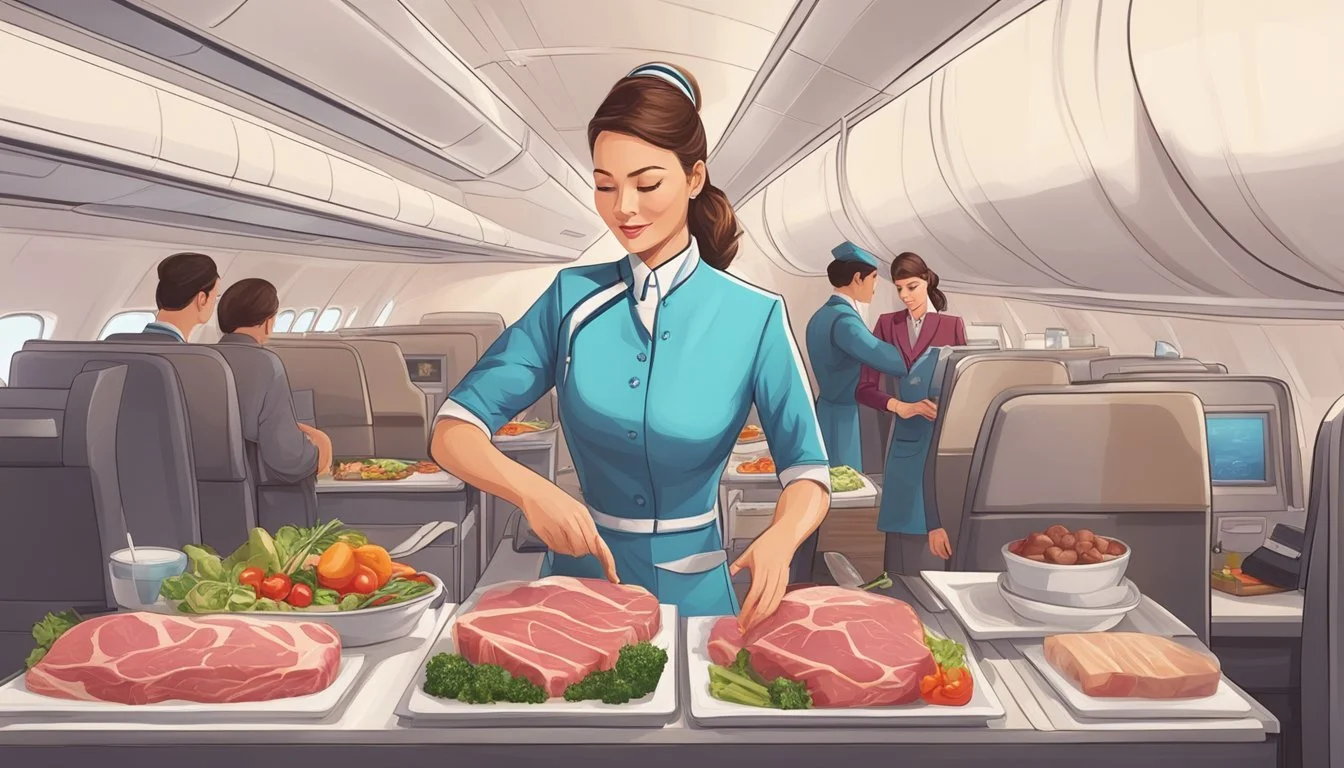The Carnivore Diet for Flight Attendants
Navigating Nutrition Amidst Irregular Hours
The carnivore diet, consisting solely of animal products, is gaining popularity among individuals seeking to reverse or improve various health conditions. Advocates of this diet, including health professionals like Dr. Ovadia, report benefits for conditions such as diabetes, obesity, autoimmune diseases, and some mental health issues. Flight attendants, with their unique and demanding lifestyle characterized by varied schedules and constant time zone changes, could potentially find the carnivore diet's simplicity and satiating nature beneficial. The diet's emphasis on limited meal frequency aligns with flight attendants' irregular eating patterns, which are often dictated by fluctuating flight schedules and limited break times.
For flight attendants, maintaining a nutritious diet while managing irregular hours and the stress of time zone shifts is a significant challenge. The traditional eating habits of frequent, light meals may not be practical due to the constraints of their working environment. By adopting a carnivore diet, flight attendants could reduce this inconvenience since it naturally leads to reduced hunger and a lower need for snacking. Nutrition is crucial for coping with the physical demands of their job, and a carnivore diet can be tailored to provide high-energy, nutrient-dense meals that are also quick and convenient.
However, the feasibility of the carnivore diet in the aviation industry must consider factors such as on-board food storage limitations and the personal dietary preferences of flight attendants. With appropriate meal planning, including suitable storage solutions for fresh foods and meals, the carnivore diet could offer an alternative dietary pattern that supports flight attendants amidst their demanding work schedules and lifestyle.
Understanding the Carnivore Diet
The Carnivore Diet prioritizes animal products, emphasizing protein and fats while eliminating plant-based foods. This section will explore its definition, nutritional composition, and how it compares with other diets.
Defining the Carnivore Diet
The Carnivore Diet is a nutritional plan that involves consuming exclusively animal products—meat, fish, eggs, high-fat dairy products, and sometimes organ meats. Unlike other diets that allow for a variety of food groups, the Carnivore Diet is restrictive, limiting the intake to animal protein and fats, with a complete elimination of plant foods such as grains, vegetables, and fruits.
Nutritional Profile
Animal products form the foundation of the Carnivore Diet, providing a rich supply of protein, essential fats, vitamins such as B12 and D, and minerals like iron, zinc, and selenium. While animal foods can be nutrient-dense, the diet has no source of dietary fiber, and it typically consists of higher amounts of saturated fat and cholesterol.
The nutritional content of the carnivore diet consists mainly of:
Protein: Essential for muscle repair and growth found in abundance in eggs, meat, and fish.
Fats: Provides energy and aids in the absorption of vitamins. Animal fats and dairy are primary sources.
Vitamins & Minerals: Liver and other organ meats offer a wealth of vitamins A, B, and D, while shellfish and meat are high in zinc and iron.
I highly recommend purchasing vitamin B12, vitamin D, iron, zinc, and fiber supplement online for a convenient shopping experience!
Comparing Carnivore to Other Diets
When comparing the Carnivore Diet to other dietary approaches such as the ketogenic diet, both restrict carbs, but ketogenic diets still include some plant-based foods. In contrast to elimination diets, which remove specific allergens or irritants, the Carnivore Diet excludes all plant-based foods, making it much more restrictive.
Low-carb diets may limit carbs but still include a variety of fiber-rich plants, whereas the Carnivore Diet allows virtually zero carbs from plant sources. On the nutritional spectrum, the absence of plant-based foods means a lack of dietary fiber and some vitamins and minerals that are commonly found in fruits, grains, and vegetables.
Health Implications
This section examines the carnivore diet's potential health implications specifically for flight attendants who face unique challenges due to their variable schedules and crossing of time zones.
Potential Health Benefits
Energy and Focus: Some flight attendants on a carnivore diet report increased energy and focus, potentially due to stable blood sugar levels since the diet eliminates carbohydrates.
Weight Loss: The high protein content of the diet may lead to satiety and reduce overall calorie intake, aiding in weight loss for some individuals.
Risks and Concerns
Nutritional Deficiencies: The carnivore diet excludes many food groups, which can result in a lack of essential nutrients and dietary fiber, leading to risks such as constipation and long-term health concerns like vitamin deficiencies.
Heart Disease and Cancer: A diet high in red and processed meats is associated with an increased risk of heart disease and cancer; flight attendants must be mindful of these risks when considering this diet.
Scientific Perspectives
Expert Opinion: Registered dietitians and healthcare providers generally recommend a balanced diet including fruits, vegetables, and whole grains to reduce the risk of chronic diseases.
Research Findings: While some studies find low-carb diets can be effective for short-term weight loss, experts highlight the importance of diverse nutrition for long-term health, and the lack of research on the impacts of a carnivore diet.
Adapting to a Flight Attendant's Lifestyle
Adapting to the unique challenges of a flight attendant's lifestyle requires meticulous attention to diet and health, especially when following a Carnivore Diet which is rich in proteins and fats.
Dealing with Varied Schedules
Flight attendants often face irregular work schedules, making consistent meal planning a challenge. Meal timing is crucial for maintaining energy levels and health. It's important for them to focus on consuming high-quality proteins such as seafood, red meat, and poultry to sustain their energy throughout varying shifts. Preparing meals in advance and having readily available nutrient-dense snacks can be beneficial in avoiding digestive discomfort during successive flights.
Managing Nutrition While Traveling
Maintaining a Carnivore Diet while traveling requires access to quality sources of protein and fats. Flight attendants should strategize their meal planning around available nutrients at different destinations. Ensuring hydration is also vital due to the dehydrating conditions within an aircraft cabin. They should:
Opt for water and electrolyte-rich beverages.
Choose lean cuts of red meat or seafood for meals when available.
Avoid processed foods to maintain diet consistency and overall health.
Tips for Coping with Time Zone Changes
Navigating through various time zones can disrupt a flight attendant's sleep schedule and meal timings, which are critical components when following any specialized diet, including the Carnivore Diet. To cope with time zone changes:
Align meal times with the destination as soon as possible to kickstart the body's adaptation process.
Consume protein-rich meals to help stay satiated and alert during wakeful hours.
Stay well-hydrated to support a steady energy level and facilitate better rest during sleep periods.
By focusing on proper nutrition, rest, and effective meal timing, flight attendants can uphold their health and diet amidst a challenging work environment.
Food Selection and Preparation
For flight attendants exploring the carnivore diet, focusing on high-quality animal products and mastering a few efficient cooking techniques are vital. These allow for maintaining nutrition while coping with the irregular schedules and time zone changes inherent to their profession.
Choosing the Right Foods
Meat and Animal Products: Selecting the right foods is the cornerstone of the carnivore diet. Beef, lamb, pork, and fatty cuts like steak and bacon provide the needed nutrients. Choosing seafood such as fish, and organ meats like liver, can offer a variety of flavors while delivering vital nutrients. These items are inherently rich in protein, vital for maintaining energy levels.
Dairy Products: Not all who follow this diet include dairy, but for those who do, opt for high-quality cheese, butter, and other dairy products that can add both nutrients and taste to meals.
Meal Planning and Cooking Tips
Recipes and Meal Plans: Flight attendants can benefit from preparing straightforward recipes that require minimal steps. For instance, grilling or pan-searing steak or chicken allows for batch cooking, which is convenient for their on-the-go lifestyle. Additionally, simple, one-pan recipes for dishes like organ meat pie or scrambled eggs with bacon can save on both preparation and cooking time.
Cooking Techniques: Incorporating a variety of cooking methods, such as slow-cooking pork chops (What wine goes well with pork chops?) in butter or sautéing scallops (What wine goes well with scallops?), ensures flight attendants can enjoy different textures and flavors without overwhelming prep work. It’s also important to consider meals that can be easily stored and eaten on board, like hard-boiled eggs or smoked salmon.
Using these guidelines, flight attendants can ensure that they have access to nutritious and satisfying meals aligned with the carnivore diet, despite the unique challenges of their work environment.
Success Stories and Advocates
The efficacy of the carnivore diet is often illustrated through compelling success stories and passionate advocates who have documented health benefits and significant weight loss.
Notable Figures within the Carnivore Community
One prominent figure is Dr. Shawn Baker, an orthopedic surgeon and a fervent supporter of the carnivore lifestyle. His own experience with improved health and athletic performance has positioned him as a leading voice within the community. Baker's advocacy for the diet extends to his social media platforms, where he actively shares research, success stories, and encouragement for those on the carnivore path.
Real-life Success Stories
Many individuals have reported profound health improvements after adopting the carnivore diet. These real-life success stories often detail the resolution of chronic health issues, enhanced mental clarity, and substantial weight loss. The carnivore community provides a robust support system for newcomers, sharing thousands of anecdotes from people who have found success with this dietary approach, covering a range of conditions from autoimmune diseases to metabolic health challenges.
Challenges and Solutions
Adopting a carnivore diet as a flight attendant involves navigating challenges inherent to irregular schedules and varying time zones. To maintain dietary consistency, flight attendants must strategize solutions to overcome these obstacles.
Common Obstacles
Flight attendants on a carnivore diet face unique difficulties, such as:
Lack of Access to Carnivore Diet-friendly Foods: Limited availability of fresh, high-quality animal products during travel.
Irregular Eating Times: Constantly changing time zones disrupt meal timing, which can lead to irregular eating habits.
Social Settings: Dietary temptations are prevalent in social settings, where meals often do not cater to carnivore diet restrictions.
Jet Lag: Disruptions to the body's clock can affect appetite and metabolism, complicating diet adherence.
Practical Tips for Overcoming Challenges
To combat these challenges, several practical steps can be implemented:
Meal Prep: Prepare and carry your meals where possible. Vacuum-sealed, cooked meats can be both practical and portable.
Persistence: Maintain a steadfast commitment to dietary principles, despite schedule constraints and temptations.
Support Systems: Establish a network of fellow carnivore dieters or utilize online forums for advice and motivation.
Implementing these solutions requires commitment but can significantly enhance dietary consistency for flight attendants.
Future Outlook
The future of the carnivore diet for flight attendants will likely be driven by emerging research and shifts in societal attitudes towards meat-centric eating habits.
Research and Developments
Recent nutritional research continues to explore the health impacts of the carnivore diet, particularly for professionals with irregular schedules such as flight attendants. These studies are critical, as they can offer new insights into how the diet affects the body under the stress of fluctuating time zones and sporadic meal times. As science advances, future research may uncover optimized variations of the diet to promote better adaptability and health outcomes within this workforce. Additionally, ongoing health studies will likely assess the long-term effects of following a carnivore diet strictly, which could influence recommendations for flight attendants.
The Carnivore Diet and Public Perception
The portrayal of the carnivore diet in the media and its representation in popular opinion play a significant role in its acceptance. As diet trends evolve, the media's role in shaping perceptions could shift the carnivore diet from a niche regimen to a more broadly endorsed lifestyle, particularly if positive health results continue to be reported. However, this is dependent on how the diet aligns with the broader discussion on sustainable eating practices and nutritional guidelines. Should the carnivore diet gain a stronger foothold in popular opinion, flight attendants may find increased support and resources for integrating this diet into their challenging routines.














